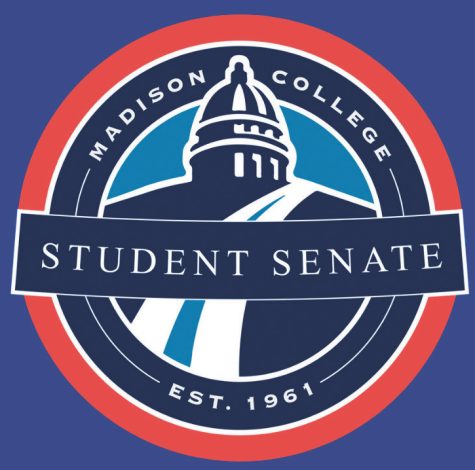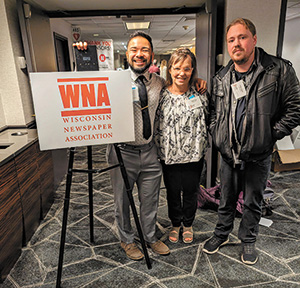Club removes poster after concerns arise
November 16, 2016
“Am I Not a Man and a Brother?” An enslaved African looks up to his white oppressor, on his knees, in shackles that trap him from his ankles to his wrists.
T’asya Thompson, liberal arts transfer student, said she was brought to tears when she saw the historic image, displayed on a poster with a bold caption stating: “The Negro is not a Human Being.”
The image was part of a poster and was displayed alongside an image of an ultrasound containing a full-grown fetus, with the caption: “The Fetus is not a Human Being.”
The poster also contained the following text: “What does abortion have to do with social justice? All injustices start with the denial of one’s personhood. When personhood is denied, even the unthinkable becomes reality.”
The image of the slave is an infamous photo which served as the symbol for the abolition of slavery in 1807, and is known for its powerful emotional appeal. The poster appeared on the halls around Madison College’s Truax campus in October, to the dismay of many students and faculty.
To Save a Life, Madison College’s pro-life club on campus, was responsible for the poster and decided to remove them upon hearing backlash, according to club president Marcella Thompson.
Thompson knew the poster was more controversial, but hoped it would engage, educate and “get people thinking.” Her group quickly realized that the ad was “too sensitive” and admitted that it was a poor choice of an image. She argued that her group wasn’t trying to dehumanize anyone, and apologized as it was not the intention of the advertisement.
The use of the image seemed to detract from the group’s initial message, and caused more anger and backlash than anything else. T’asya, staring at the ad, added: “Knowing that slavery was oppressive to us, and going and putting something up like that, and knowing the history behind it… it doesn’t help their message at all. I look at this flyer and it looks racist. It makes me angry. You don’t ever compare slavery to abortion. They don’t compare. This isn’t educating people, it’s just making people angry.”
The flyer was brought to the attention of the Student Life office by a Madison College faculty member, Amiee Wiersma, who found the flyers “volatile.” Wiersma was shocked when she saw the flyers, and said: “In this day and age, when there’s increased tension because of media, that is the last thing that anyone needs to see – especially during the political season.”
Advisor of the student club, Breck Speers, said that if the poster was properly interpreted, “it speaks in favor of African Americans.” He continued by saying that, “If they can’t have a historical document posted, then I think that’s censorship, because this is a historical document. I’m hoping that we don’t get to the point where we can’t use historical documents in our education because I think that would be a hindrance of free speech. If we can’t face what our history is about, I don’t think we’re going to grow.”
Some argue, however, that there is a difference between free speech and responsible speech. Professor of Race and Ethnicity in the U.S. and Introduction to Sociology, Michael Billeaux, shared his thoughts on the subject.
“It’s the kind of comparison you really want to be careful with. It adds to the environment being filled with messages of ‘you don’t really belong’ and ‘this really isn’t your space because your history is not important,’ ‘your problems aren’t important,’ unless they are helpful to us and so I think that makes the college a worse place for students of color and a deficit for the entire college… You’re pulling from such an ugly history that’s not too far behind us. It was a real thing that a lot of real people really went through,” Billeaux said.
Many question on what grounds can the comparison between abortion and slavery be made. Billeaux offered a deeper insight.
“In the strict legal sense, they are comparable because you can invoke certain constitutional clauses for each. But substantively they’re obviously very, very different kinds of situations, one having to do with the market and ownership of human beings. On the other hand, it’s the matter of women’s control over their own medical lives, over their own bodies,” Billeaux said.
“I think it’s possible to oppose abortion and not rely on this very dubious comparisons which aside from being dubious and not clear that there’s any parallel, is offensive.”
Billeaux also explained the impact such an ad can have on the student body, specifically black students.
“It’s as if your race keeps coming up and getting used against you in some way, and either people have a problem with you because they are prejudiced or uncomfortable or don’t understand your presence on campus, which is questioned, and people assume ‘Oh, you’re here because of affirmative action stuff, those kinds of indignities and… on the other hand, people will use the history of the oppression of people of color as a tool for their own purposes. It expresses ownership over this history in a way.”
Speers and club members said they would aim for inclusivity over shock value in the future flyers that the group uses to avoid offensive material, due to the fact that these flyers detracted from their original intention of offering support and education to Madison College students.









